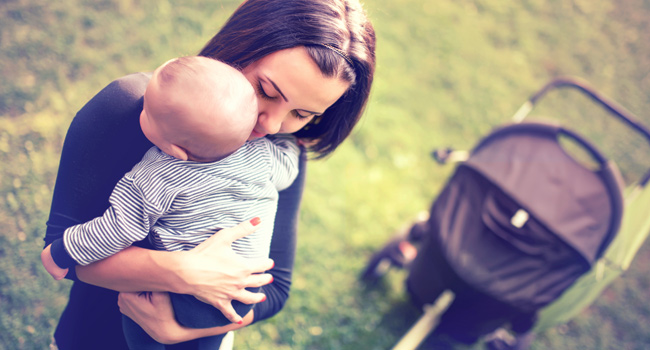Adjusting to life with your new baby

There’s no doubt about it - having a baby is an amazing experience. It’s also a life-changing experience, and definitely takes some time getting used to. From dealing with visitors and coping with unexpected emotions, to eating healthily and getting enough sleep, it’s full of ups and downs. So it’s important to try and take care of yourself, as well as your little one.
What should I do about visitors?
With your new baby at home, you’re bound to have more visitors than you can cope with at times. Some mums like the company, while others prefer to keep to themselves. But really, it’s about setting boundaries that feel right for you. The truth is, for the first few weeks, you’ll be in a constant routine of feeding, nappy changing, feeding again, midwife visits, more feeding and if you’re lucky – some sleep in between! So it’s a good idea to decide what your visiting limits are, and letting your partner or family members manage it for you. This means if you just need some space, or you’re too tired to hold a conversation, someone else can make this happen. On the other hand, if you’re dying for a distraction, or some adult conversation, they can arrange this too.
It’s okay to feel that way
Giving birth is an emotional and exhausting experience. So don’t be surprised if you have a mix of feelings over the first few days or weeks – overjoyed, scared, drained, tearful, stretched, smitten or overwhelmed. Importantly, don’t disregard any ‘down’ or sad feelings. Instead, try and speak to someone you trust about it – your partner, a family member, close friend or your midwife or GP. The ‘baby blues’ is extremely common and can happen 3 – 5 days post birth. The good thing is it should only last a day or two. But if these feelings stick around, it could be sign of postnatal depression. In this case, speak to your doctor or midwife straight away for help and support. You can also find more information from the Mental Health Foundation website.
Sleep
Managing sleep deprivation is one of the hardest changes to life with a newborn. But if it’s any comfort, every new mum goes through it. Even the best behaved babies will still wake up during the night for feeds. You might of heard the phrase ‘sleep when the baby sleeps’ – which is great if your baby actually does sleep! But it’s true – if at all possible (sometimes it just isn’t!) try and get as much sleep and rest as you possibly can. Your partner or a family member could help by holding the baby while you have a nap between feeds, or being in charge of the nappy and clothes changing while you’re in charge of the feeding. Find ways to be active, like taking your new baby for a walk or joining a mum and baby exercise class, as well as nutritious healthy eating will ensure that the small amount of sleep you do get is quality.
A little help goes a long way
It’s important to accept any help and support that’s offered by friends and family. Also, you shouldn’t be afraid to ask for help and support when you really need it. Say yes to things like home cooked meals, offers to do housework, childcare for your other kids, everyday errands, or even just holding your baby. Don’t feel that you have to “do it all”. Other ways to find great support is to join a local mothers group, play group or coffee group. It’s important to spend time with people who make you feel good and are emotionally supportive. Ask your Plunket Nurse or contact a Parent’s Centre for groups near you.
Keeping up healthy eating habits
You’ve just welcomed your new baby into the family. It’s an exciting and busy time, but it’s not the time to stop looking after yourself. Staying healthy is as important now as it was during pregnancy, so it’s important to get some strategies in place early. For reference, have a read over our article, Healthy Eating After Childbirth.
The importance of midwife appointments
It is your midwife who’ll be providing you with the health professional care you need from birth to 4-6 weeks after. They’ll be checking your baby at birth and for the weeks after, helping you to start breastfeeding and giving you the support you need to keep it up, making sure your baby has somewhere safe to sleep, and monitoring your baby’s growth. The visits in the first few weeks will be in your home while the ones after, may or may not be at their clinic.